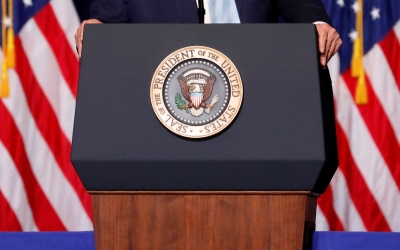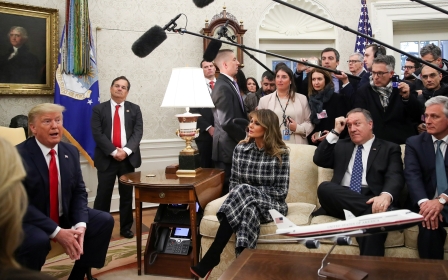US Democrats remain unconvinced Soleimani threat was imminent

Top Democrat Nancy Pelosi is so unconvinced by President Donald Trump's reasons for killing Iranian general Qassem Soleimani that she announced on Wednesday the House of Representatives will vote on a War Powers resolution aimed at limiting the president's power to strike Iran.
After a briefing by the Trump administration on its rationale for killing Soleimani, House Speaker Pelosi said that her "concerns were not addressed" as to what the strategy was to keep Americans safe in the aftermath of recent escalations.
"The Administration must work with the Congress to advance an immediate, effective de-escalatory strategy that prevents further violence," Pelosi said in a statement on Wednesday. "America and the world cannot afford war."
The bill will be moved to the floor of the House on Thursday, Pelosi said.
The Trump administration has tried to satisfy questions about the strategy behind the killing by arguing that Soleimani was in Iraq to plan attacks against Americans in the region and that the strike was an urgent measure to save lives.
On Wednesday, intelligence officials from the administration gave a briefing to Congress behind closed doors stressing that point. Still, many Democrats emerged from the hearing even more sceptical about the White House's argument that a threat was looming.
"We're told it was an imminent threat. I'm not sure I'm convinced about that," said Democratic Congressman Eliot Engel, who chairs the House Foreign Affairs Committee.
"Look, the person we took out was no sweetheart. I was no fan of his, and I'm no fan of the Iranian regime. The question is, do we want to get sucked into another war? For the past 20 years or so, we've been preoccupied with war after war, and I'm not convinced this is any different."
The Trump administration has been stressing that killing Soleimani was a defensive move rather than an escalatory step against Iran.
"In recent days, he was planning new attacks on American targets. But we stopped him," Trump said in a speech earlier on Wednesday.
AUMF
Legislators were told on Friday that Trump used the 2002 military authorisation to invade Iraq as legal grounds to kill Soleimani in Baghdad without congressional authorisation.
In 2001, Congress swiftly passed the Authorization for Use of Military Force (AUMF), granting then-President George Bush broad authority to go after the perpetrators of the September 11 attacks on US soil. A year later, Congress passed another AUMF de facto approving the war on Iraq.
'There are a lot of unanswered questions... but I'm not sure that 'trust me' is a satisfactory answer for me'
- Eliot Engel, chair of the House Foreign Affairs Committee
Democratic lawmakers have been trying to repeal both authorisations.
Earlier this week, Democratic congresswomen Ilhan Omar and Barbara Lee introduced a resolution to limit the use of both authorisations to strike Iranian targets.
Pelosi said she is considering moving this legislation to a vote as well.
Engel told reporters after the briefing on Wednesday: "There are a lot of unanswered questions... but I'm not sure that 'trust me' is a satisfactory answer for me."
He also said that he has invited Secretary of State Mike Pompeo to testify at the Foreign Affairs Committee next week.
Congressman Gerry Connolly, a Virginia Democrat, was more blunt in criticising the content of the briefing.
"It was sophomoric and utterly unconvincing," he said. "I believe more than ever that Congress needs to act to protect the Constitutional provisions about war and peace."
He also dismissed the legal justification for the attack on Soleimani, saying the 2001 AUMF had nothing to do with Iran.
"I believe there was no rationale that could pass a graduate school thesis test. I was utterly unpersuaded about any evidence about the imminence of a threat that was new or compelling."
Republicans stand with Trump
Tensions spiked over the past few weeks in what has been a volatile relationship between Washington and Tehran since Trump walked away from the Iran nuclear deal in 2018.
Iran-linked militias have been accused of several attacks on US bases in Iraq.
Late last month, a rocket strike at a military base in Kirkuk Iraq killed one American contractor and left four wounded. Washington, which blamed the Iran-backed Popular Mobilisation Forces (PMU) for the attack, responded with air strikes that killed 25 PMU fighters.
The PMU then attempted to storm the US embassy in Baghdad. Last week, the US took tensions to an unprecedented level by killing Soleimani, one of Iran's most powerful figures.
On Monday night, Iran launched a barrage of ballistic missiles that hit bases in Iraq hosting US forces, but did not cause any casualties.
Despite increasing Democratic criticism of Trump's foreign policy, the president's Republican Party has remained almost unanimous in backing the White House's approach to the crisis in the region.
Several House Republicans came out of Wednesday's briefing praising Trump, sounding shocked that their Democratic rivals were not entirely convinced that the assassination of Soleimani foiled imminent Iranian plots against Americans.
Republicans compared the assassination of Soleimani to targeted killings of militants ordered by former President Barack Obama, ignoring the fact that the Iranian general was an official of a foreign country.
Congressman Steve Scalise said the briefing was helpful. The world is "a safer place with Soleimani gone", he added.
"We should all be coming together to support our commander-in-chief to protect America," Scalise said. "Not debating how to limit the president's ability to defend this country."
Middle East Eye propose une couverture et une analyse indépendantes et incomparables du Moyen-Orient, de l’Afrique du Nord et d’autres régions du monde. Pour en savoir plus sur la reprise de ce contenu et les frais qui s’appliquent, veuillez remplir ce formulaire [en anglais]. Pour en savoir plus sur MEE, cliquez ici [en anglais].





